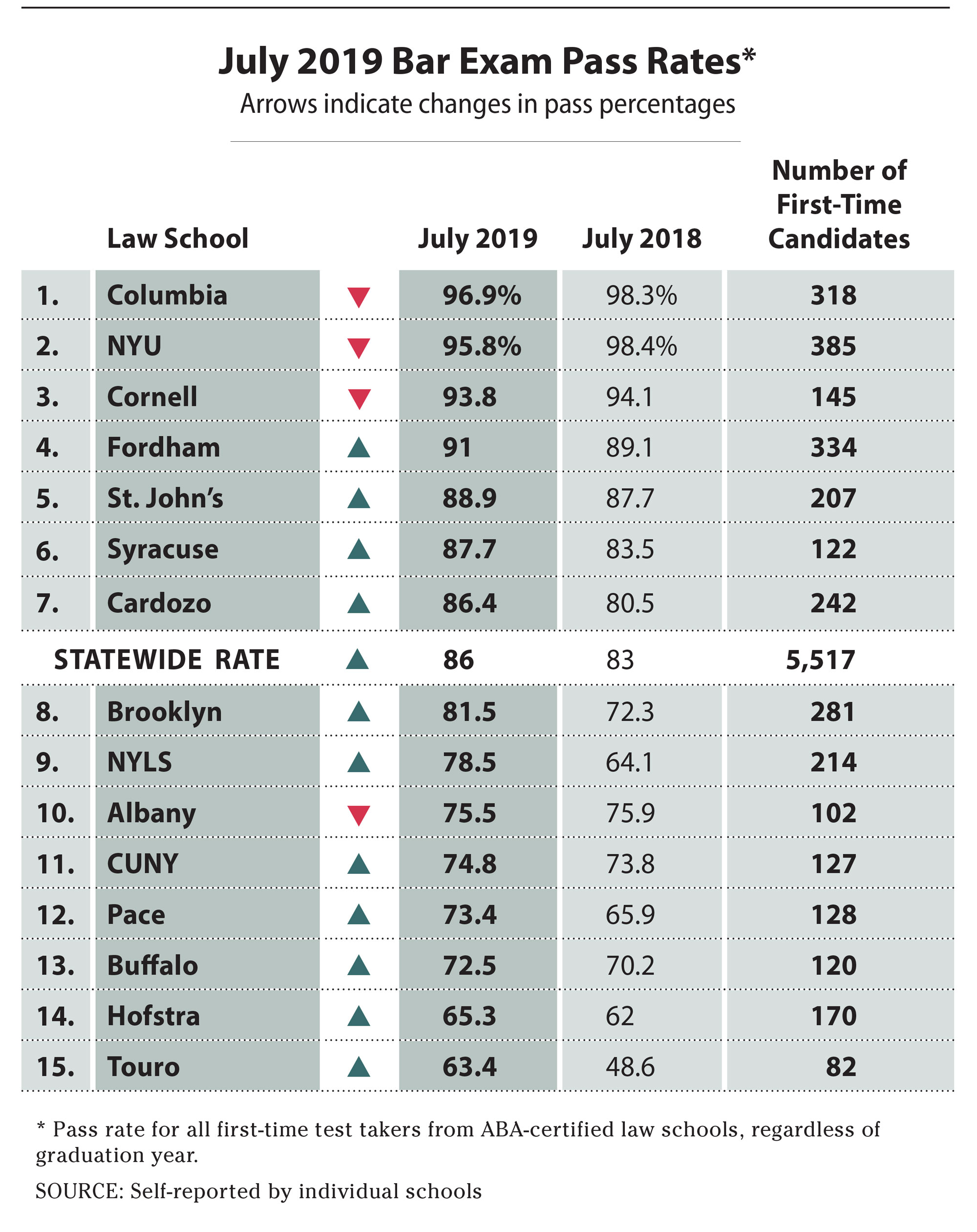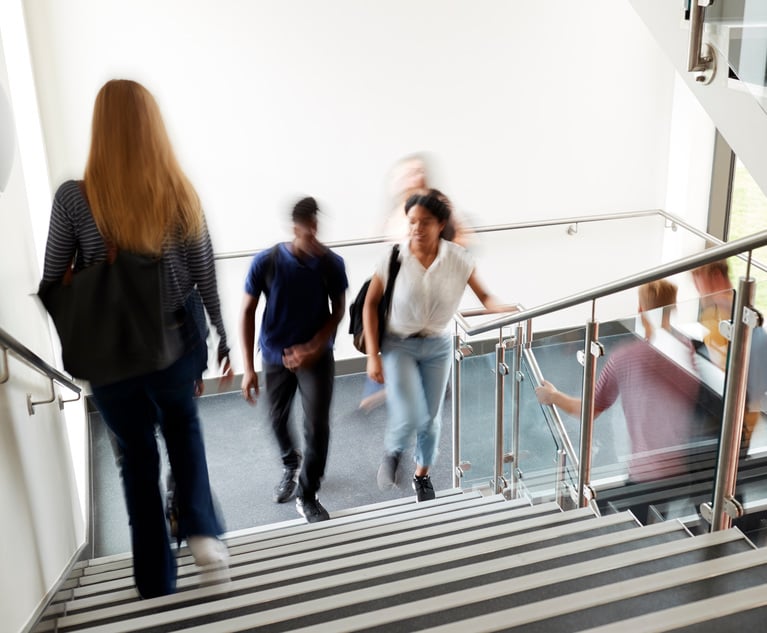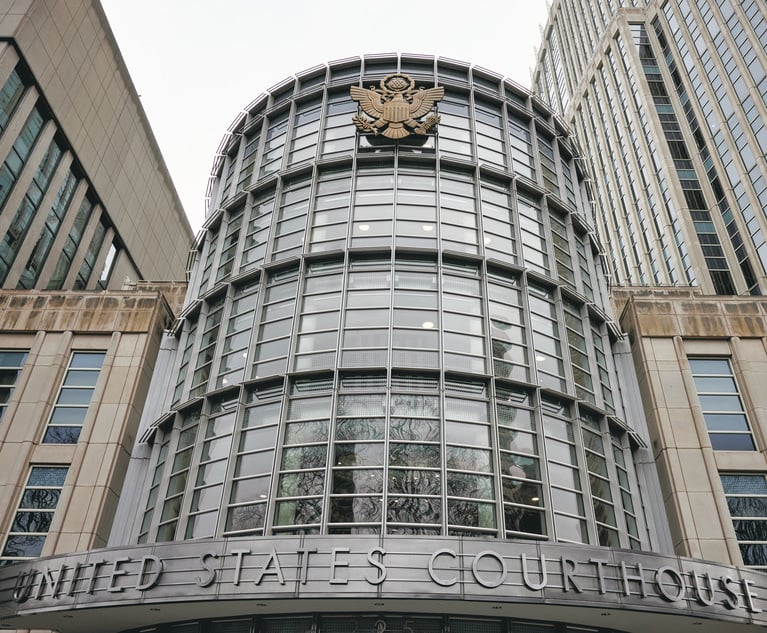Amid Dips at the Top, Most New York Law Schools See Rise in Bar Pass Rates
The New York bar exam's July pass rates fell slightly from last year for Columbia, NYU and Cornell students.
December 03, 2019 at 03:03 PM
5 minute read
 Photo: panitanphoto/Shutterstock.com
Photo: panitanphoto/Shutterstock.com
The gap in first-time July bar exam pass rates between alumni of New York's top-ranking law schools and the rest of the pack narrowed this year.
Among New York's 15 law schools, 11 saw increases, even modest ones, in first-time test taker bar pass rates from the July exam compared with last year. Bar pass rates at three top schools lowered a bit, while there were sharp improvements at two schools.
A rising tide lifted most boats. The pass rate on New York's July bar exam for all first-time test takers who graduated from law schools certified by the American Bar Association rebounded from 83% last year to 86% this year. There were 5,517 test takers in that category, comprising about 55% of test-takers. Other groups, like foreign lawyers and people taking the test after having previously failed, tend to have lower pass rates.
 The New York bar exam pass rate among first-time test takers from three traditionally high-ranking schools—Columbia Law School, the New York University School of Law and Cornell Law School—fell slightly from last year, although the pass rate at all three schools was solidly in the mid-90s, according to data from the schools.
The New York bar exam pass rate among first-time test takers from three traditionally high-ranking schools—Columbia Law School, the New York University School of Law and Cornell Law School—fell slightly from last year, although the pass rate at all three schools was solidly in the mid-90s, according to data from the schools.
The pass rate declined from 98.3% to 96.9% for Columbia grads, from 98.4% to 95.8% for test takers from NYU and from 94.1% to 93.8% at Cornell.
Albany Law School also saw a slight decrease in its pass rate, from 75.9% to 75.5%.
The pass rate for most other schools rose, with double-digit increases for law graduates from New York Law School and Touro College Jacob D. Fuchsberg Law Center. Touro's jump helped narrow the gap between the top and bottom pass rates among New York law schools to 33.5 percentage points, a drop from the nearly 50 percentage point gap recorded last year, when Touro's pass rate was in the high 40s.
Touro Law's first-time bar pass rate remained the lowest among all New York law schools, but it increased its rate by 14.8 percentage points, from 48.6% to 63.4%. That's close to its 64.8% first-time pass rate on the summer 2017 bar exam and within spitting distance of Hofstra's 65.3% pass rate.
"This year's rate is a step forward," said Touro Dean Elena B. Langan in a statement. "I expect we will maintain an upward trend as we continue to implement new initiatives and work closely with each of our students. Many of our recent efforts have yielded positive results and I am confident that we can continue to support students in ways that will be beneficial."
New York Law School increased its first-time test taker pass rate more than any other school in the New York Law Journal's sample, from 64.1% to 78.5%. Anthony Crowell, the dean and president of NYLS, attributed the increase to changes the school made to its course of study around the time that its class of 2019 began their legal educations.
"We're very encouraged by our nearly 15 percentage point increase from last year," Crowell said in a statement. "This outcome follows the full implementation of our new curriculum adopted in 2016, which includes targeted academic and bar success initiatives."
Other schools with pass rates below the state average still saw significant improvements over last year. Brooklyn Law increased its first-time bar pass rate from 72.3% to 81.5%, an increase of 9.2 percentage points over last year and 2.9% over its summer 2017 first-time pass rate. The first-time pass rate at Elisabeth Haub School of Law at Pace University rose 7.5 percentage points, from 65.9% to 73.4%, which is still shy of the 77.5% pass rate its alumni recorded on the 2017 exam.
A handful of schools saw more modest increases in their bar pass rates. The rate at Maurice A. Deane School of Law at Hofstra University rose from 62.0% to 65.3%, University at Buffalo School of Law's from 70.2% to 72.5% and Fordham University School of Law's from 89.1% to 91%. The pass rate rose about 1% for first-time test takers from two schools: The City University of New York School of Law, where it rose from 73.8% to 74.8%, and St. John's University School of Law, where it rose from 87.7% to 88.9%.
The number of first-time test-takers from the 15 law schools in the NYLJ's sample varied from 82 at Touro to 385 at NYU. For schools with fewer test takers, the passage or failure of just a few students can translate to noteworthy changes in pass rates.
Mary Campbell Gallagher, the president of bar prep program BarWrite and an observer of the bar exam, said the New York school results weren't a surprise. She noted that a great deal of the variation in performance could be explained by the LSAT results and undergraduate GPAs of incoming law students.
Even if a school's curriculum doesn't hit some areas on the Uniform Bar Examination, students have two months to prepare themselves, Gallagher said. "The higher the school is in their rankings, the less it worries about what's on the bar exam," she said.
Correction: A previous version of this story had the incorrect 2018 pass rate for Cardozo in the chart. The error has been corrected.
Read More
Bar Exam Pass Rates Dive at 5 NY Schools While Top Programs Increase Their Advantage
More Touro Graduates Fail Bar Exam Than Pass, Prompting Dean to Call Results Unacceptable
This content has been archived. It is available through our partners, LexisNexis® and Bloomberg Law.
To view this content, please continue to their sites.
Not a Lexis Subscriber?
Subscribe Now
Not a Bloomberg Law Subscriber?
Subscribe Now
NOT FOR REPRINT
© 2025 ALM Global, LLC, All Rights Reserved. Request academic re-use from www.copyright.com. All other uses, submit a request to [email protected]. For more information visit Asset & Logo Licensing.
You Might Like
View All
The Met Hires GC of Elite University as Next Legal Chief

NY Appellate Panel Cites Student's Disciplinary History While Sending Negligence Claim Against School District to Trial

'No Evidence'?: Big Law Firms Defend Academic Publishers in EDNY Antitrust Case
3 minute read
'Substantive Deficiencies': Judge Grants Big Law Motion Dismissing Ivy League Price-Fixing Claims
3 minute readTrending Stories
- 1'It's Not Going to Be Pretty': PayPal, Capital One Face Novel Class Actions Over 'Poaching' Commissions Owed Influencers
- 211th Circuit Rejects Trump's Emergency Request as DOJ Prepares to Release Special Counsel's Final Report
- 3Supreme Court Takes Up Challenge to ACA Task Force
- 4'Tragedy of Unspeakable Proportions:' Could Edison, DWP, Face Lawsuits Over LA Wildfires?
- 5Meta Pulls Plug on DEI Programs
Who Got The Work
Michael G. Bongiorno, Andrew Scott Dulberg and Elizabeth E. Driscoll from Wilmer Cutler Pickering Hale and Dorr have stepped in to represent Symbotic Inc., an A.I.-enabled technology platform that focuses on increasing supply chain efficiency, and other defendants in a pending shareholder derivative lawsuit. The case, filed Oct. 2 in Massachusetts District Court by the Brown Law Firm on behalf of Stephen Austen, accuses certain officers and directors of misleading investors in regard to Symbotic's potential for margin growth by failing to disclose that the company was not equipped to timely deploy its systems or manage expenses through project delays. The case, assigned to U.S. District Judge Nathaniel M. Gorton, is 1:24-cv-12522, Austen v. Cohen et al.
Who Got The Work
Edmund Polubinski and Marie Killmond of Davis Polk & Wardwell have entered appearances for data platform software development company MongoDB and other defendants in a pending shareholder derivative lawsuit. The action, filed Oct. 7 in New York Southern District Court by the Brown Law Firm, accuses the company's directors and/or officers of falsely expressing confidence in the company’s restructuring of its sales incentive plan and downplaying the severity of decreases in its upfront commitments. The case is 1:24-cv-07594, Roy v. Ittycheria et al.
Who Got The Work
Amy O. Bruchs and Kurt F. Ellison of Michael Best & Friedrich have entered appearances for Epic Systems Corp. in a pending employment discrimination lawsuit. The suit was filed Sept. 7 in Wisconsin Western District Court by Levine Eisberner LLC and Siri & Glimstad on behalf of a project manager who claims that he was wrongfully terminated after applying for a religious exemption to the defendant's COVID-19 vaccine mandate. The case, assigned to U.S. Magistrate Judge Anita Marie Boor, is 3:24-cv-00630, Secker, Nathan v. Epic Systems Corporation.
Who Got The Work
David X. Sullivan, Thomas J. Finn and Gregory A. Hall from McCarter & English have entered appearances for Sunrun Installation Services in a pending civil rights lawsuit. The complaint was filed Sept. 4 in Connecticut District Court by attorney Robert M. Berke on behalf of former employee George Edward Steins, who was arrested and charged with employing an unregistered home improvement salesperson. The complaint alleges that had Sunrun informed the Connecticut Department of Consumer Protection that the plaintiff's employment had ended in 2017 and that he no longer held Sunrun's home improvement contractor license, he would not have been hit with charges, which were dismissed in May 2024. The case, assigned to U.S. District Judge Jeffrey A. Meyer, is 3:24-cv-01423, Steins v. Sunrun, Inc. et al.
Who Got The Work
Greenberg Traurig shareholder Joshua L. Raskin has entered an appearance for boohoo.com UK Ltd. in a pending patent infringement lawsuit. The suit, filed Sept. 3 in Texas Eastern District Court by Rozier Hardt McDonough on behalf of Alto Dynamics, asserts five patents related to an online shopping platform. The case, assigned to U.S. District Judge Rodney Gilstrap, is 2:24-cv-00719, Alto Dynamics, LLC v. boohoo.com UK Limited.
Featured Firms
Law Offices of Gary Martin Hays & Associates, P.C.
(470) 294-1674
Law Offices of Mark E. Salomone
(857) 444-6468
Smith & Hassler
(713) 739-1250






